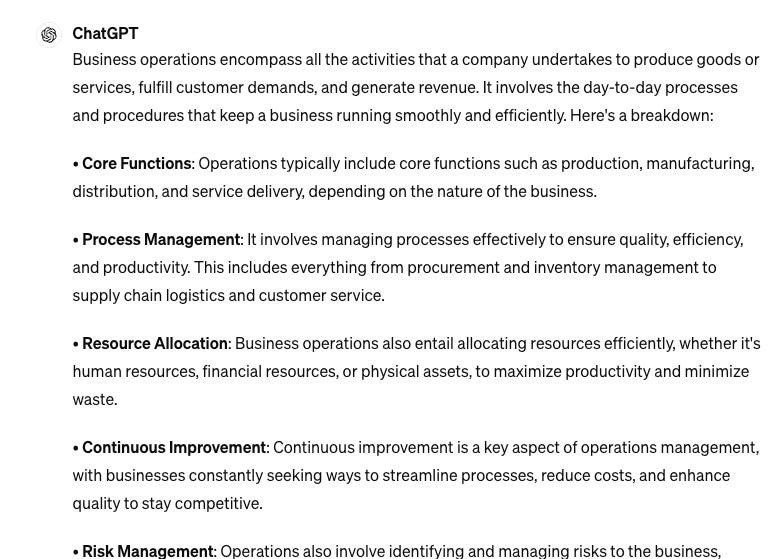So, what exactly is “business operations”?
I chucked this term into ChatGPT and got an alphabet soup of MBA-jargon:
Google wasn’t much better, the search term seems to surface more questions about people who do the job, with varying degrees of seniority.
Seems like I’m not the only one wondering about the function:
So when a friend I respect deeply for his professionalism, drive and intellect strongly recommended I connect with this week’s guest, I got really curious that her background was in “Business Operations”.
We instantly hit it off.
It was such a pleasure learning from Minli Virdone, who brings a wealth of experience from tech giants like McKinsey, LinkedIn, and Twilio.
In this episode, we unravel the critical role of business operations (BizOps) in driving growth, in the context of tech companies.
This conversation delves deep into the nitty-gritty of BizOps, shedding light on its real-world applicability, the journey from strategy to execution, and the pivotal part it plays in both established companies and startups.
Key Takeaways:
BizOps is a multifaceted function that serves as the nerve center for aligning strategy, monitoring performance, and executing key growth initiatives within an organization.
Identifying and focusing on a few critical metrics that truly impact a business's revenue and growth is more effective than monitoring a vast array of data points.
Startups and early-stage companies can benefit from BizOp's principles, even without employing a full-fledged team, by ensuring they perform the essential functions with existing resources.
The Consummate Generalist: BizOps in Driving Organizational Synergy
Minli Virdone describes herself as the "consummate generalist," a term resonating with her ability to navigate cross-functional projects and orchestrate different areas of a business in harmonious unison. BizOps emerges as a catalyst in ensuring that all parts of an organization are moving toward a common goal.
"I love figuring out how do you get all the disparate parts of an organization and the people to come together so that we're marching along the same lines and can get to an exciting outcome."
The key to advancing this role is establishing trust-based relationships with various departments. By acting almost as internal consultants to functional leads, whether in sales, marketing, or product, a BizOps team can rigorously analyze metrics and subtly steer towards more opportune revenue-generating activities.
"One thing that I think is very important for BizOps is that we have business partners...We work to make our business partners and the business successful."
This hands-on, collaborative approach is essential, dispelling any notions of BizOps as an aloof, strategy-only function. Instead, it provides businesses with the agility to capitalize on emerging opportunities and pivot direction when needed.
The Strategic Dance: Rigorous Performance Management and Continuous Adaptation
Minli underscores the importance of strategy formulation, performance management, and program management as the three pillars of an effective BizOps function. While strategy lays out the aspirations, performance management necessitates a keen eye on the day-to-day, and program management is the bridge to tangible actions.
"...we need to figure out how to increase more self-serve customers self-serving into our product...between product and marketing...that's where I've seen the unlock be really valuable."
Employing this strategic trifecta enables a company to differentiate itself in the marketplace by ensuring that its vision is not just an abstract concept but a living, breathing reality that is constantly monitored and modified.
It marvelously blends the fluid thinking often associated with startups with the grounded execution required for scalability.
"That's when you know you've driven value because you're getting a pull from the organization of something that you've done."
Operating with a forward-looking performance matrix while being willing to adjust tactics underscores a vital lesson. Effective strategy and operations are not set in stone; they are more akin to a dance, adjusting to the rhythm of the ever-changing market.
Startup Scaling: The Art of Building with a BizOps Blueprint
Transitioning from enterprise to the startup world entails a switch from well-oiled machines to high-potential yet often chaotic environments. Minli shares her insights into applying her enterprise experience to nimbler, smaller organizations, emphasizing the art of focus and the importance of transparency in driving growth and revenue understanding in early-stage companies.
"Many of the folks that I've spoken to tend to shy a little bit away from the word monetization and revenue...it's actually really healthy to just be very fact-based and open..."
Startups can apply BizOps principles by beginning with hypotheses about essential business metrics and continuously refining and focusing on the most impactful ones. This iterative approach mirrors the lean startup methodology, where the principle of validated learning dictates business decisions.
"...start out with some kind of hypothesis of what metrics matter...then organically allow this thing to grow out."
Lastly, aligning these principles with business objectives helps founders communicate their vision, involving the entire team in the monetization conversation and empowering them to contribute effectively.
Watch the interview and tell me about your biggest takeaways!











